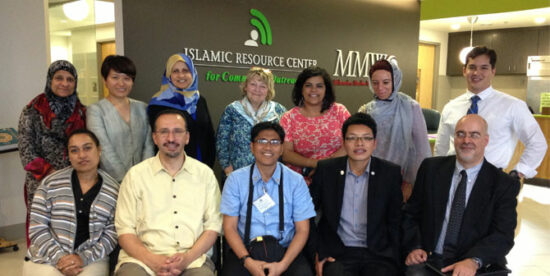
Frank Zeidler served as mayor of Milwaukee, WI for three terms from 1948 to 1960. He recently died at the age of 93 and is remembered for being deeply committed to improving the city of Milwaukee. Frank held fast to his role as a citizen of the world, and was a driving force behind the local United Nations Association and numerous other efforts to establish a framework for international peace and a more just distribution of resources globally.
There are a number of parallels between the world Frank Zeidler inhabited in the 1950s and our current political and social landscape. Most notably are the acute levels of national anxiety around the oft-demonized “other” which in the 1950’s was embodied by the “Red Scare,” and today, the lingering “war on terror.” Both moments in history require individuals like Frank to rise above rhetoric that focuses on the differences that divide us as individuals and nations, and instead, emphasize the commonalities that unite us.
IIW seeks to bring people together to understand their local and global neighbors
On a recent visit to Milwaukee, I saw the legacy of Frank Zeidler alive and well through IIW’s work arranging programs for participants in the U.S. Department of State International Visitor Leadership Program (IVLP). According to Al Durtka, the president of IIW, “Milwaukee is a very diverse place that is entrenched in various cultural and ethnic identities. Over the past century, millions of people have resettled in the area from around the world.” His organization seeks to bring people together to understand who their local and global neighbors are to ultimately achieve a more peaceful coexistence.
My visit came on the heels of the Sikh Temple shooting that occurred in August 2012 in Oak Creek, Wisconsin. I was particularly interested in learning more about community resources that work to build bridges between cultures and faiths to avoid similar tragedies. The Sikh Temple shootings are a microcosm of the very real global threat that religious extremism has on communities in our own backyard as well as in nations and regions around the world. The effects of religious extremism can literally tear nations and regions apart.
IIW partners with two organizations, the Milwaukee Muslim Women’s Coalition and the Interfaith Conference of Greater Milwaukee, that—like Frank Zeidler—work to bring people of different faiths together from the local community in an effort to promote greater justice, harmony, peace, and understanding.
Janan Najeeb is the president of the Milwaukee Muslim Women’s Coalition and has hosted dozens of IVLP delegations over the years, ranging from journalists to religious clerics. Janan, her team, and members find great value in meeting these delegations because of the profound two-way learning that takes place. International visitors benefit from meeting individuals, often from their home country, who emigrated to the United States and they learn first-hand about the challenges and opportunities immigrants face.
Janan is often inspired by the level of sharing and candor that occurs between immigrants and IVLP participants who share a similar heritage. “They are able to ask each other the tough questions that they might not feel comfortable discussing in their home country or region.” Hopefully through these interactions we can encourage visitors to expand or enrich their view of the diversity of America and vice-versa.
My visit came on the heels of the Sikh Temple shooting that occurred in August 2012 in Oak Creek, Wisconsin.
Tom Heinen is the executive director of the Interfaith Conference of Greater Milwaukee, a nonprofit organization that brings leaders from 13 different denominations and faiths together to work on social justice issues and improve the quality of life for everyone. According to Tom, hosting international visitors gives their regionally-focused efforts an international reach. Many of the countries they represent are not as diverse as the U.S., and the concept of building an inclusive and diverse community is new to them. They are intrigued by the approaches the Interfaith Conference takes to celebrate religious diversity as well as their specific efforts to bring religious leaders together around common causes. The Interfaith Conference and its members believe they are “planting seeds all over the world by modeling what it takes to have people work together.”
Leaders like former Mayor Frank Zeidler, Al Durtka, Janan Najeeb, and Tom Heinen strengthen the fabric of their communities through partnerships that build on a common vision and values, while also contributing to the greater cause of building a more peaceful, prosperous world.
By: Jennifer Clinton PhD, President, Global Ties U.S.
